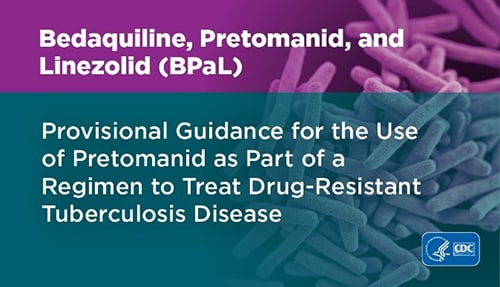Dear Colleague Letters
CDC Releases New Provisional Guidance for the Use of Pretomanid as part of a Regimen [Bedaquiline, Pretomanid, and Linezolid (BPaL)] to Treat Drug-Resistant Tuberculosis Disease
February 1, 2022
Dear Colleagues,
On August 14, 2019, the Food and Drug Administration (FDA) approvedexternal icon the use of pretomanid, a nitroimidazooxazine, as part of an all-oral combination with bedaquiline and linezolid [BPaL], administered by direct observation to adults with a diagnosis of pulmonary extensively drug resistant or treatment intolerant or nonresponsive multidrug-resistant tuberculosis (TB) disease.

Today, CDC released “Provisional CDC Guidance for the Use of Pretomanid as part of a Regimen [Bedaquiline, Pretomanid, and Linezolid (BPaL)] to Treat Drug-Resistant Tuberculosis Disease.” The new provisional guidance includes considerations for clinicians on administration, precautions and adverse event monitoring, microbiologic monitoring, and more.
Key points:
- CDC recommends the use of pretomanid in combination with bedaquiline and linezolid in the treatment of adults with pulmonary extensively drug-resistant, pre-extensively drug-resistant (i.e., resistant to isoniazid, rifampin, and at least one fluroquinolone or a second-line injectable) or treatment intolerant/nonresponsive multidrug-resistant TB disease when a safe and effective treatment regimen cannot otherwise be provided.
- Patients receiving BPaL must be monitored closely for adverse events, particularly peripheral and optic neuropathy, myelosuppression, and hepatotoxicity.
- Patients should be evaluated for signs and symptoms of TB disease during treatment as an indication of nonresponse to the regimen and assessment for acquired resistance.
- These guidelines will be updated as additional studies are published utilizing pretomanid in short course regimens for treatment of patients with multidrug-resistant.
We encourage clinicians, pharmacists, and public health professionals to review the new provisional guidance. When drug-resistant TB is suspected or confirmed, providers should consult a TB expert physician. Clinicians and providers can contact state and local TB control offices and TB Centers of Excellence for Training, Education and Medical Consultation for additional information on diagnosing and treating drug-resistant TB disease.
CDC has additional information on drug-resistant TB disease for clinicians, public health professionals, and patients.
Thank you for your work and continued commitment to address the challenges of drug-resistant TB.
Sincerely,
Philip LoBue, MD, FACP, FCCP
Director
Division of Tuberculosis Elimination
National Center for HIV, Viral Hepatitis, STD, and TB Prevention